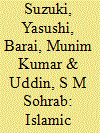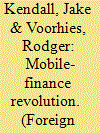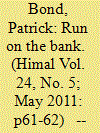| Srl | Item |
| 1 |
ID:
103097


|
|
|
| 2 |
ID:
127079


|
|
|
|
|
| Publication |
2013.
|
| Summary/Abstract |
With diverse histories and attitudes toward risk-taking, different financial systems have a common aim: ensuring financial stability and efficiency within a geographical region. But differences exist between various financial systems as a result of their evolution and adaptation to their surrounding environment. This paper aims to analyze the incentive and sanction mechanisms of the Islamic mode of banking and the Grameen Bank model of microcredit in Bangladesh, and how they help ensure their financial stability and efficiency. We challenge the conventional explanations of their success. We point out that the informal sanction mechanisms embedded in the two modes of financial intermediation - avoiding non-compliance with Islamic Shari'ah (revealed divine law) in the case of Islamic banking, and kinship-based groupings or gushtis in the case of microcredit - play important roles in lowering the transaction costs of screening and enforcing contracts. We also point out how bank rent opportunity - the promised return from non-participatory financing and a high spread supported through low-cost funds provided by donor agencies and compulsory savings - is captured in each of the two modes, playing a further important role in maintaining their franchise values, given the specificities of the Bangladeshi financial context.
|
|
|
|
|
|
|
|
|
|
|
|
|
|
|
|
| 3 |
ID:
127919


|
|
|
|
|
| Publication |
2014.
|
| Summary/Abstract |
The roughly 2.5 billion people in the world who live on less than $2 a day are not destined to remain in a state of chronic poverty. Every few years, somewhere between ten and 30 percent of the world's poorest households manage to escape poverty, typically by finding steady employment or through entrepreneurial activities such as growing a business or improving agricultural harvests. During that same period, however, roughly an equal number of households slip below the poverty line. Health-related emergencies are the most common cause, but there are many more: crop failures, livestock deaths, farming-equipment breakdowns, even wedding expenses.
|
|
|
|
|
|
|
|
|
|
|
|
|
|
|
|
| 4 |
ID:
083660


|
|
|
|
|
| Publication |
2008.
|
| Summary/Abstract |
Despite the vast literature on the economic and social affects of micro-financing in poor countries, little attention has been given to its political implications. At a time when the broader development implications of micro-financing are being recognized-thanks, in part, to the Nobel Prize Award to Prof. Yunus and the Grameen Bank-political scientists have an opportunity to contribute to and learn from the study of this financial instrument. This paper traces the existing microcredit-and more broadly the microfinance-literature to delineate the ways in which microcredit can contribute to the political awareness and activism of the poor, i.e., their political empowerment. I argue that the link between microcredit and political empowerment is self-efficacy and social capital, which can be generated from a particular form of microcredit lending where clients apply for loans as a group and share responsibility for repayment. Furthermore, I make the case for why the Central Asia and Caucasus region would provide an appropriate case to analyze the political effects of microfinance. Research in this area will not only fill an obvious gap in the literature, but it will also help microfinance institutions, donor communities and governments to better understand the wider political implications of microfinance and the ways by which to measure them
|
|
|
|
|
|
|
|
|
|
|
|
|
|
|
|
| 5 |
ID:
103878


|
|
|